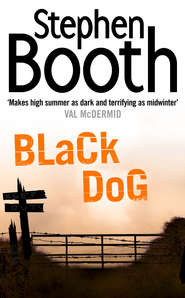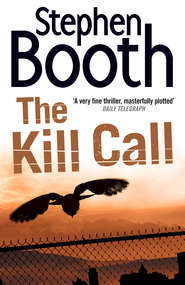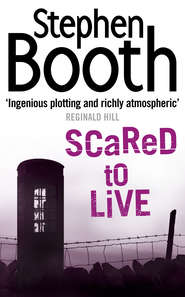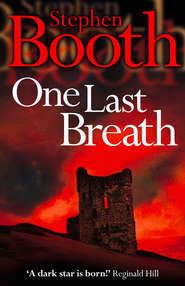По всем вопросам обращайтесь на: info@litportal.ru
(©) 2003-2024.
✖
Cooper and Fry Crime Fiction Series Books 1-3: Black Dog, Dancing With the Virgins, Blood on the Tongue
Автор
Год написания книги
2018
Настройки чтения
Размер шрифта
Высота строк
Поля
‘Aye. Middle Whites, they were. Some folk like the old breeds, but the Whites grow better.’
Cooper closed his eyes, feeling the conversation running away from him already. Bizarrely, a memory popped into his mind of the slippery fish he used to try to catch by hand as a boy in the streams around Edendale. He knew they were there, lurking in the shady corners, and he could almost get his hands on them in the water. But it needed only a couple of wriggles and they were out of his grasp, every time. He suddenly felt utterly depressed, and wondered what on earth he had hoped to achieve by coming here tonight. He was totally in the wrong place. But he had no idea what the right place for him was just now.
He drained his glass and stood up wearily.
‘Off already?’ asked Sam. ‘Company not suit you?’
‘I’m wasting my time,’ said Cooper, as he walked away towards the door.
Outside, the sky was still light and the evening was warm. He stood for a moment, breathing in the motionless air and looking up at the shape of Raven’s Side, looming above the village. He remembered then that there was one place where he always felt he belonged.
The door to the pub had been propped open to let out the heat, and he didn’t hear anybody come up behind him. But he recognized the slow voice that spoke in his ear.
‘If you ask the right questions, you’ll find out what you want to know.’
‘Oh yes? I’m not sure about that, Mr Dickinson. At the moment, it all seems pretty futile.’
Harry looked at him with sudden understanding. ‘Fed up?’
‘You might say that.’
‘Ah. I reckon you’ve got the black dog, lad.’
‘What?’
‘That’s what we used to say to the young ‘uns when they were sulking or had a fit of temper. “The black dog’s on your back,” we’d say. That’s what’s up with you, I reckon.’
Sulking? It was a long time since he had been accused of sulking. As if he was some temperamental adolescent.
‘Yes, I’ve heard of it, thanks.’
‘Don’t mention it, lad.’
Now the old man had explained the expression, Cooper remembered that he had heard it before. He could hear a faint echo of his own mother’s voice chiding him for having the black dog. It was one of those mysterious expressions from childhood that you only half understood at the time. The black dog. Words with a frisson of meaning that had always worked on his imagination. Looking back, he had a feeling that the young Ben Cooper had pictured some huge, terrifying beast coming down from the moors, with red eyes and slavering jaws. The memory was confused now with the stories his Grandma Cooper had told, of the legendary Black Shuck and the Barguest – giant hounds with glowing eyes that waylaid unfortunate travellers on certain roads at night and took them straight to hell.
‘The black dog’s on your back’, they said. It wasn’t a very nice image. Once the picture had been planted in his mind, it had been difficult to get rid of. It had cropped up in his nightmares, waking him with snapping jaws and ferocious eyes. As a child, he would have done anything to get rid of that black dog from his back. Usually, his mother could help him do it. She could always cheer him up, and chivvy him out of a depressed mood.
Now, though, when the tables were turned, he was helpless to remove an immense black dog from his mother’s back.
Harry looked at him sharply, suspicious at the silence. Cooper shook himself and stared back at the old man.
‘Well, I’ve got to go now, Mr Dickinson. Maybe I’ll see you again.’
‘I don’t doubt, lad.’
A few minutes later, Cooper was sitting on Raven’s Side, looking across the dusk-filled valley towards Win Low.
He liked the names of the hills in this part of the Peak, with their resonances of the Danish invaders who had occupied Derbyshire for several decades. He had been taught at school that the Raven had been the symbol of Odin, the chief of the Viking gods. And the Danes had not been alone in investing the hills with supernatural powers.
On the far side of the valley, the last rays of the setting sun lit the western flanks of the Witches in blood-red streaks, highlighting them in melodramatic three-dimensional relief. At any moment, they might launch themselves into the air on their broomsticks. No wonder the ancient inhabitants of the valley had been in awe of them. The rocky gritstone outcrops were a brooding and malevolent presence at the best of times, their shapes black and ominous on the sunniest day. It would be easy for superstitious villagers to blame them for all sorts of evils and misfortunes.
Cooper was sitting close to where Gary Edwards must have stood with his binoculars on the night that Laura Vernon had been killed. The view extended from the back gardens of the cottages in Moorhay in one direction to the roof of the Old Mill at Quith Holes in the other, and down over the sweeping woodland to the meandering road far below in the valley bottom. The stream was invisible from here, and the trees were thick in the area where Laura’s body had been found.
The last shreds of the evening light were playing tricks in the deeper patches of woodland, distorting the shadows and deadening the colours until the greens and browns merged into each other in a mesh of dark patches tinged with violet. The light was slanting almost vertically down from the hill, flattening out the perspective and reducing the woods to a two-dimensional landscape where colour meant nothing.
Cooper looked again at the summit of Win Low and the Witches. There was an ancient pack horse road crossing the tor, below the shadow of the twisted rocks. But it would be a brave traveller who went that way at night. It was all too easy to imagine the black hounds of the legends prowling up there on the dark ridge, waiting to pounce.
And once the black dogs of hell were on your back, you could never shake them off.
20 (#ulink_e230cd83-8966-5e22-96e2-db28f95a0a01)
‘Oh God,’ said Superintendent Jepson. ‘We’ll never hear the end of it. This is the sort of thing the division will never live down. It’ll be in the local press, the national tabloids, we’ll make the joke item on the TV news. And for certain it’ll be in the Police Review. We’ll be the laughing stock of every force in the country. I can hear the jokes about us now. It’ll go on for years. Years!’
The superintendent had DCI Tailby and DI Hitchens in his office before the morning briefing. They had faced the difficult task of explaining to the divisional commander why a dozen officers had been employed to dig up a giant compost heap, and why the pathologist had then been called to examine two dead pigs.
‘We could probably find something we could charge Cutts with,’ said Hitchens. ‘To justify the exercise, so to speak.’
‘No, no, no. That would only make it worse. Let’s just play it down and hope it passes over after a day or two. Has the press office been briefed?’
‘I did it last night,’ said Tailby. ‘They’ve got bare details, but after that they have to refer enquiries to me. I’ll stonewall them.’
‘All right, Stewart, but I can’t understand how it happened.’
‘Ben Cooper had one of his inspirations,’ said Hitchens.
‘Ah, young Cooper. We had that business with the Sherratt arrest too.’
‘It could have been a disaster if DC Fry hadn’t been there.’
‘If Cooper had got himself shot …’ Jepson shuddered. ‘It would be a total public relations catastrophe. Nobody’s forgotten what happened to his father.’
‘We can’t afford that sort of incident, no matter how you look at it,’ agreed Tailby.
Jepson turned to Hitchens. ‘You keep your ear to the ground regarding the staff in your department, don’t you, Paul?’
‘I try to, sir.’
‘You know we’ll have to be making the decision on DS Osborne’s replacement very soon. He signs off for good at the beginning of next month. DC Cooper was one we had in mind for the job, wasn’t he?’
‘He was top of the shortlist,’ said Hitchens.
‘What’s your view on that now?’
‘Frankly, he appears to be a touch emotionally unstable. He was very moody yesterday. All over something and nothing, as far as I can gather.’
‘This new DC, though. Fry …’
‘She’s got better qualifications than Cooper. And she seems very stable, despite her past history.’











